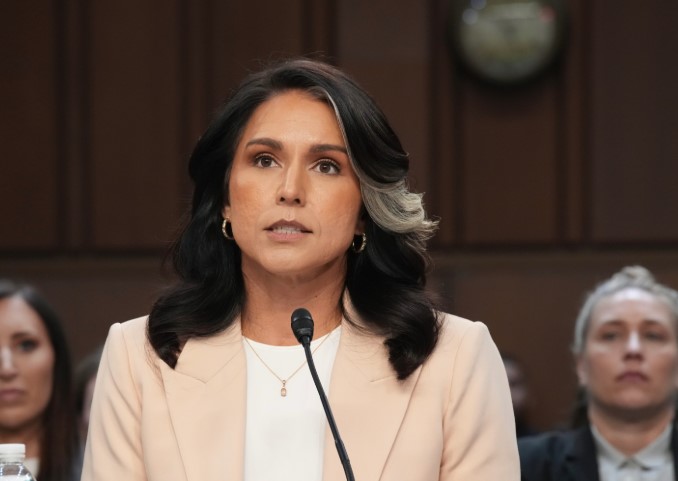In a dramatic move, the Office of the Director of National Intelligence (ODNI) has released a series of documents suggesting that the Obama administration may have politicized Russia intel about interference in the 2016 U.S. presidential election.
ODNI Director Gabbard Releases Shocking Russia Intel Documents
The announcement came on Friday afternoon through a press release from ODNI Director Tulsi Gabbard. She claimed to have “revealed overwhelming evidence” that top officials under President Obama, including national security leaders, “manufactured and politicized Russia intel findings.” According to her statement, she launched this effort to carry out a “years-long coup” against then-President Donald Trump.
The newly formed group within ODNI, called the “Director’s Initiatives Group,” made the documents public. This group carries out executive orders issued by President Trump, especially those aimed at rebuilding trust in the U.S. Intelligence Community and restoring credibility to Russia intel assessments.
Among the newly declassified materials were internal memos and emails that had been previously classified. These documents were part of a larger effort to challenge the long-standing assessment by intelligence agencies that Russia intel pointed to deliberate interference aimed at helping Donald Trump win the 2016 U.S. presidential election.
Tulsi Gabbard, who took over as director of ODNI, also shared these conclusions on social media platforms such as X (formerly Twitter) and Truth Social. She repeated the claim that Russia intel was skewed or misrepresented by the previous administration to serve a political agenda.
Emails and Memos Dispute Key Russia Intel Claims
The declassified documents include a timeline and correspondence between Obama-era intelligence officials. One key email, with the sender’s name blacked out, said, “There is no indication of a Russian threat to directly manipulate the actual vote count through cyber means.”
However, the same email added that cyber activity targeting election infrastructure might still affect “public confidence” in the election process. In short, officials did not believe Russian hackers could change vote counts, but they warned that the hackers’ efforts could still shake voter trust.
According to the newly published documents, officials concluded that Russia was unlikely to compromise the physical voting systems or alter vote totals without detection. But they did warn that disinformation and cyber intrusions could influence voter perceptions.
⚔️ U.S. and China locked in shadow spy war over secrets in silicon
The timeline released by Gabbard focuses on internal discussions before the official 2017 intelligence assessment. Officials emphasized in these conversations that although Russian cyber attacks on election infrastructure achieved limited success, they were more concerned about the psychological impact on voters.
Gabbard argued that this shows a double standard. She claimed these conclusions undercut the 2017 assessment, which stated that Russia tried to influence the 2016 election. But intelligence experts and former officials have pointed out that the 2017 assessment never claimed that vote tallies were changed or that election systems were hacked at scale. Instead, the report focused on tactics such as spreading disinformation, using fake social media accounts, and leaking stolen emails.
Critics Call the Release Political and Misleading
Many lawmakers have criticized the timing and content of Gabbard’s release. Some see it as an effort to stir controversy ahead of political events. Democratic members of Congress were quick to push back.
Representative Jim Himes, a Democrat from Connecticut, responded online, calling the release “utter nonsense.” Senator Mark Warner, a Democrat from Virginia and the vice chairman of the Senate Intelligence Committee, accused Gabbard of “weaponizing her position” and promoting conspiracy theories.
Critics say the newly released documents do not actually disprove the 2017 intelligence assessment. That assessment, compiled by multiple agencies, concluded that Russian actors aimed to influence the U.S. election through online disinformation and strategic leaks.
Earlier in July, CIA Director John Ratcliffe published a separate report that also questioned the Obama administration’s role. He claimed that officials had “manipulated intelligence” to target Trump. But that report, like Gabbard’s release, stopped short of saying that Russian interference had not occurred. Instead, it suggested that some officials may have selectively emphasized parts of the data.
Germany’s Spy Agency Officially Declares AfD an Extremist Threat to Democracy
The CIA’s internal review of its own assessment methods did not reject the 2017 conclusions. It acknowledged that certain procedures could be improved for clarity and fairness but said that the final analysis of Russia intel remained “defensible.”
Supporters of the original assessment argue that the new documents do not change the core finding: Russia interfered in the 2016 election mainly through psychological tactics, not by tampering with ballots. Despite ongoing political debate, experts and official reviews still point to Russia’s influence campaigns as the main threat identified that year.
